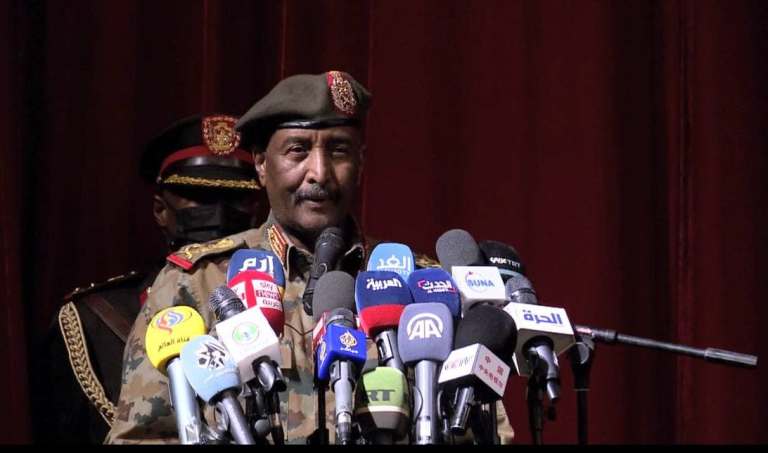General Burhan and Islamists in Sudan – allies or foes?
October 12, 2022 (KHARTOUM) – For many people, perception is tantamount to truth and Sudan is no different. Ever since the October 25th military coup led by General Abdel-Fattah al-Burhan, the latter is widely believed to be bringing Islamists and ex-regime figures from the cold into the government machinery.
In a bid to shake off this impression, Burhan told his audience in Nile River state that “Anyone who claims that the armed forces support the [ex-ruling] National Congress [party] is a liar. We support the Sudanese people”.
The chairman of the Sovereign Council rejected suggestions of the army’s bias in favour of the Islamists or that the military is working to rehabilitate the National Congress Party (NCP).
What helped fuel this perception?
- Following last year’s coup, the military has quietly reinstated NCP supporters who worked for the government as well as their affiliated NGO’s. Their assets that were confiscated by the disbanded Empowerment Removal Committee were also returned.
- NCP senior figures have also resurfaced including former foreign minister Ali Karti who made a public appearance in a television interview. Karti also chaired a meeting of a key body in the Islamic movement. The latter are now able to meet and reorganize in the aftermath of the coup which suggested a comfort level that did not exist pre-coup.
It does not stop here: The last prime minister in the Bashir regime Mohamed Taher Ella returned to Sudan from his self-imposed exile in Egypt to a euphoric and sizable reception by his supporters despite being wanted on corruption-related allegations.
Is there a secret deal between the Islamists and the military?
On the eve of the October 2021 military coup, the Secretary-General of the People’s Congress Party (PCP) Ali al-Haj Mohamed abruptly dissolved the party’s Secretariat and terminated the mandate of its acting leader Bashir Adam Rahma.
Another PCP leading figure, Abu Bakr Abdel-Razek told Al-Intibaha newspaper in early 2022 “There are some, so as not to generalize, who participated in the coup arrangements and some of them were even notified of the zero hour, and all this without the knowledge of Secretary-General Ali al-Haj and the General Secretariat, and therefore the Secretary-General had the right to dismiss them”.
This was the first time that an Islamist figure publicly acknowledged that there had been arrangements between the Islamists and the leaders of the coup in advance of overthrowing the government of Prime Minister Abdullah Hamdok.
Who contacted the PCP leaders?
A member of the PCP General Secretariat of the Conference told {Sudan Tribune} that NCP leaders contacted their PCP counterparts and told them about the pending military coup.
But another PCP figure rejected the purported coordination emphasizing that this notification came through coincidence and during an unplanned phone call.
In search of political allies
The putschists were believed to be looking for political allies that can serve as an alternative to the Forces of Freedom and Change (FFC). NCP leaders promised the military to give them just that.
A source close to Islamist circles told {Sudan Tribune} “From the first moment of the coup, it was clear that an established party with a broad base stood behind it and provided it with counsel and support. The coup leaders feared civil disobedience that would paralyze state institutions. But this party provided them with a first batch comprised of 3,000 civil servants who returned to work within a month of the coup”.
A service ministry employee, who requested that his name be withheld for fear of reprisal said “Things have returned to the way they were before the fall of Omar al-Bashir. Most of the officials who were loyal to the NCP have returned to their positions”.
Did the Islamists infiltrate the military?
Al-Burhan’s talk about not siding with Islamists was also intended to counter the prevailing narrative about differences between him and the commander of the paramilitary Rapid Support Forces (RSF) Mohammed Hamdan Dagalo (Hemetti) that is connected to Al-Burhan’s perceived alliance with the Islamists.
The news website “Monte Caro”, which is usually considered credible had reported that a heated meeting took place back in August between Karti and Hemetti at the request of the latter.
According to the website Karti quizzed Hemetti on the reasons behind his hostility towards the Islamic movement.
Karti also allegedly issued a veiled threat to Hemedti in saying “You don’t know anything about our [Islamic movement] presence, inside the mother institution [the army] and we never lost our presence within this institution”.
Karti also reportedly went on to say “Despite your continuous attacks on the Islamic movement, we have not taken any hostile measures against you. You know that the RSF law that was legislated and approved in parliament was the decision of the Islamic movement and not [president] Omar al-Bashir as you think”.
The “Monte Caro” website said that in response Hemedti contended that the attack on Islamists was part of the general sentiment that he did not create.
Hemetti had admitted during an interview with the BBC in August that the military failed in post-coup Sudan.
“Unfortunately, we did not succeed in the change [October coup], for reasons that I will not talk about now. When you think about change, you have a goal and a vision for change. The thing was planned, and it didn’t work. Now it got worse.”

